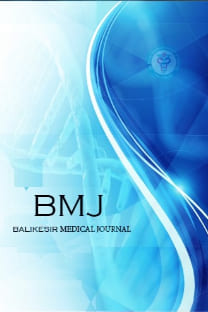Gebelik Kaybı Sonrası Akut Stres Bozukluğunun Değerlendirilmesi
Amaç: Çalışmamız gebelik kaybı olan kadınlarda akut stres bozukluğunu değerlendirmeyi ve önlemeyi amaçlamıştır.
GEREÇ VE YÖNTEM: Mart 2019-Mart 2021 tarihleri arasında Kadın Hastalıkları ve Doğum Anabilim Dalı 2. Düzey merkezlere başvuran gebeler çalışmaya dahil edildi. 21 haftadan az gebelik kaybı olan kadınlar "gebelik kaybı grubu"na, sağlıklı gebeliği olan kadınlar ise "kontrol grubu"na atanmıştır. Katılımcılardan bir anket doldurmaları istendi. Ankette gebelik öyküsü, sosyodemografik veriler ve tıbbi öykü ile ilgili sorular yer aldı. Anketin ardından hastalardan travma sonrası stres bozukluğu (TSSB) ölçeğini doldurmaları istendi. Çalışmaya katılan hastaların 91'i (%35) gebelik kaybı grubunda, 156'sı (%65) kontrol grubundaydı. İstatistiksel olarak p < 0.05 anlamlı kabul edildi.
Bulgular: Gebelik kaybı olan hastaların yaş ortalaması 27.52±5.60 yıl, kontrol grubundaki gebeler 26.43±5.44 yıl idi. İki grubun yaş ortalaması benzerdi (p=0,656). Katılımcıların TSSB puanı 33.10±9.3'tür (min=15, max=49). Gebelik kaybı yaşayan olguların TSSB puan ortalamaları kontrol grubunda 36.23±9.49 ve 31.12±7.34 idi. Gebelik kaybı olan grubun TSSB puanı kontrol grubuna göre anlamlı olarak yüksekti (p=0,003).
SONUÇ: Çalışmamızda gebelik kaybı yaşayan kadınlarda akut stres bozukluğu belirtilerinin daha sık olduğu bulundu. Gebelik kaybı yaşayan çiftler sosyal ve psikolojik destek almalıdır. Psikolojik destek ve danışmanlık, çiftin psikolojisi için çok önemlidir. Bu sayede kadının yaşadığı rahatsızlığın travma sonrası stres bozukluğuna dönüşmesi engellenebilir.
Anahtar Kelimeler:
Akut stres, gebelik kaybı, düşük, acute stress, pregnancy loss, miscarriage
Evaluation of Acute Stress Disorder After Pregnancy Loss
Aim: Our study aimed to assess and prevent acute stress disorder in women with pregnancy loss.
Materials And Methods: Pregnant women presenting to the Department of Obstetrics and Gynecology at level 2 centers between March 2019 and March 2021 were included in the study. Women with pregnancy loss of fewer than 21 weeks were assigned to the "pregnancy loss group" and women with healthy pregnancies were assigned to the "control group." Participants were asked to complete a questionnaire. The questionnaire included questions about pregnancy history, sociodemographic data, and medical history. After the questionnaire, patients were asked to complete the post-traumatic stress disorder (PTSD) scale. Of the patients who participated in the study, 91 (35%) were in the pregnancy loss group and 156 (65%) were in the control group. Statistically, p < 0.05 was considered significant.
Results: The mean age of the patients with pregnancy loss was 27.52±5.60 years, whereas the pregnant women in the control group were 26.43±5.44 years old. The mean age of the two groups was similar (p=0.656). The PTSD score of the participants was 33.10±9.3 (min=15, max=49). The mean PTSD score of the cases who suffered pregnancy loss was 36.23±9.49 and 31.12±7.34 in the control group. The PTSD score of the group with pregnancy loss was significantly higher than that of the control group (p=0.003).
Conclusion: In our study, symptoms of acute stress disorder were found to be more common in women who experienced pregnancy loss. Couples who have suffered pregnancy loss should receive social and psychological support. Psychological support and counseling are very important for the couple's psyche. In this way, the woman's disorder can be prevented from developing into post-traumatic stress disorder.
Keywords:
acute stress, pregnancy loss, miscarriage,
___
- Farren J, Jalmbrant M, Falconieri N, Mitchell‐Jones N, Bobdiwala S, Al‐Memar M, et al. Differences in post‐traumatic stress, anxiety and depression following miscarriage or ectopic pregnancy between women and their partners: multicenter prospective cohort study. Ultrasound in Obstetrics & Gynecology. 2021;57(1):141-8.
- Quenby S, Gallos ID, Dhillon-Smith RK, Podesek M, Stephenson MD, Fisher J, et al. Miscarriage matters: the epidemiological, physical, psychological, and economic costs of early pregnancy loss. The Lancet. 2021;397(10285):1658-67.
- Köneş MÖ, Yıldız H. The level of grief in women with pregnancy loss: a prospective evaluation of the first three months of perinatal loss. Journal of Psychosomatic Obstetrics & Gynecology. 2021;42(4):346-55.
- Ertan D, Hingray C, Burlacu E, Sterlé A, El-Hage W. Post-traumatic stress disorder following childbirth. BMC psychiatry. 2021;21(1):1-9.
- Kjerulff KH, Attanasio LB, Sznajder KK, Brubaker LH. A prospective cohort study of post-traumatic stress disorder and maternal-infant bonding after first childbirth. Journal of psychosomatic research. 2021;144:110424.
- Hollins Martin CJ, Reid K. A scoping review of therapies used to treat psychological trauma post perinatal bereavement. Journal of Reproductive and Infant Psychology. 2022:1- 17.
- Kersting A, Wagner B. Complicated grief after perinatal loss. Dialogues in clinical neuroscience. 2022.
- Slade P, Murphy A, Hayden E. Identifying post-traumatic stress disorder after childbirth. bmj. 2022;377.
- Nakajima S, Masaya I, Akemi S, Takako K. Complicated grief in those bereaved by violent death: the effects of post-traumatic stress disorder on complicated grief. Dialogues in clinical neuroscience. 2022.
- Sénéchal M, Taillefer C, Payot A. The Medical Process in Pregnancy Terminations for Fetal Anomaly: An Analysis of Counselling and Bereavement. Journal of Obstetrics and Gynaecology Canada. 2022;44(1):54-9.
- Cohen JA, Scheeringa MS. Post-traumatic stress disorder diagnosis in children: challenges and promises. Dialogues in clinical neuroscience. 2022.
- Szepietowska EM, Zawadzka E, Filipiak S. Symptoms of post-traumatic stress disorder and the sense of gains and losses during the Covid-19 pandemic: an international study. International Journal of Environmental Research and Public Health. 2022;19(6):3504.
- Thakur A, Choudhary D, Kumar B, Chaudhary A. A Review on Post-traumatic Stress Disorder (PTSD): Symptoms, Therapies and Recent Case Studies. Current molecular pharmacology. 2022;15(3):502-16.
- Ho AL, Hernandez A, Robb JM, Zeszutek S, Luong S, Okada E, et al. Spontaneous Miscarriage Management Experience: A Systematic Review. Cureus. 2022;14(4).
- Kinser PA, Jallo N, Amstadter AB, Thacker LR, Jones E, Moyer S, et al. Depression, anxiety, resilience, and coping: the experience of pregnant and new mothers during the first few months of the COVID-19 pandemic. Journal of Women's Health. 2021;30(5):654-64.
- Yayın Aralığı: Yıllık
- Başlangıç: 2017
- Yayıncı: Balıkesir Üniversitesi
